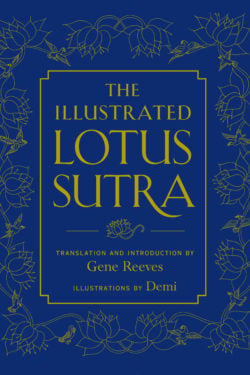Gene Reeves

Gene Reeves studied, taught, and wrote in Japan for twenty years, primarily on Buddhism and interfaith relations. When he retired from the University of Tsukuba, where he taught for eight years, he served as the international advisor at Rissho Kosei- kai. He was a founder of and the special minister for the International Buddhist Congregation in Tokyo, and he also served as the international advisor to the Niwano Peace Foundation and was the coordinator of an annual International Seminar on the Lotus Sutra. In the spring of 2008, Reeves was a visiting professor at the University of Peking, Beijing, China.
Reeves was active in interfaith conversations and organizations: he served as chair of the Planning Committee for the 1987 Congress of the International Association for Religious Freedom (IARF) at Stanford University; he was one of the founders of the Council for a Parliament of the World’s Religions; and he was a member of the Board of the Society for Buddhist Christian Studies. In Japan he was an advisor to the Japan Liaison Committee of the IARF and a participant in the Religious Summit at Mount Hiei and in various activities of the World Conference of Religions for Peace. As a Buddhist teacher, he traveled frequently to China, Singapore, Taiwan, America, and Europe to give talks at universities and churches, mainly on the Lotus Sutra.
Gene Reeves died in 2019.
Books, Courses & Podcasts
The Lotus Sutra
The Lotus Sutra is regarded as one of the world’s great religious scriptures and most influential texts. It’s a seminal work in the development of Buddhism throughout East Asia and, by extension, in the development of Mahayana Buddhism throughout the world. Taking place in a vast and fantastical cosmic setting, the Lotus Sutra places emphasis on skillfully doing whatever is needed to serve and compassionately care for others, on breaking down distinctions between the fully enlightened buddha and the bodhisattva who vows to postpone salvation until all beings may share it, and especially on each and every being’s innate capacity to become a buddha.
Gene Reeves’s new translation appeals to readers with little or no familiarity with technical Buddhist vocabulary, as well as long-time practitioners and students. In addition, this remarkable volume includes the full “threefold” text of this classic.
The Stories of the Lotus Sutra
Stories are ancient and wondrous tools with the mysterious power to transform lives. And the stories and parables of the Lotus Sutra-one of the world’s great religious scriptures and most influential texts-are among the most fascinating and dramatic.
In this fun, engaging, and plain-English book, Gene Reeves-the translator of Wisdom’s critically acclaimed and bestselling edition of the Lotus Sutra-presents the most memorable and remarkable of the Lotus Sutra’s many stories and parables, along with a distillation of his decades of reflection on them in an accessible, inspiring, and naturally illuminating way.
The Stories of the Lotus Sutra is the perfect companion to Reeve’s breathtaking translation of this scriptural masterpiece as well as a thoroughly enjoyable stand-alone volume for those who want to bring the inspiring teachings of the bodhisattva path into their daily lives.
Introduction to the Lotus Sutra
The Lotus Sutra—one of the most popular Buddhist classics—is here accessibly introduced by one of its most eminent scholars.
“Soon after entering university in December of 1943, I was sent to the front as a student soldier. I wondered if I were allowed to bring but a single book on the trip, possibly to my death, which would I want to bring. It was the Lotus Sutra.”
—from the author’s Preface
Having developed a lifelong appreciation of the Lotus Sutra—even carrying a dog-eared copy with him through service in World War II—Yoshiro Tamura sought to author an introduction to this beloved work of Buddhist literature. Tamura wanted it to be different than other basic explorations of the text; his introduction would be plain-spoken, relevant and sensitive to modern concerns, and well-informed by contemporary scholarship. He succeeded marvelously with Introduction to the Lotus Sutra, which Gene Reeves—Tamura’s student and translator of the popular English edition of The Lotus Sutra—translates and introduces in English for the first time here. Tackling issues of authenticity in the so-called “words of Buddha,” the influence of culture and history on the development of the Lotus Sutra, and the sutra’s role in Japanese life, Introduction to the Lotus Sutra grounds this ancient work of literature in the real, workaday world, revealing its continued appeal across the ages.
The Illustrated Lotus Sutra
The Lotus Sutra is regarded as one of the world’s great religious scriptures and most influential texts. It’s a seminal work in the development of Buddhism throughout East Asia and, by extension, in the development of Mahayana Buddhism throughout the world. Taking place in a vast and fantastical cosmic setting, the Lotus Sutra places emphasis on skillfully doing whatever is needed to serve and compassionately care for others, on breaking down distinctions between the fully enlightened buddha and the bodhisattva who vows to postpone salvation until all beings may share it, and especially on each and every being’s innate capacity to become a buddha.
This illustrated edition features more than 110 full-page and two-page illustrations by a world-renowned and award-winning artist, and brings the fantastical and image-filled world of the Lotus Sutra vividly to life. Demi’s illustrations are both classical and contemporary in feel, perfectly complementing Reeves’s masterful and modern translation.





